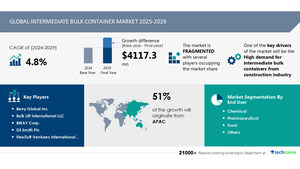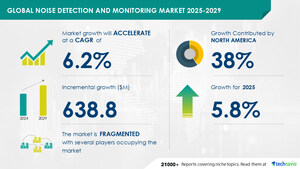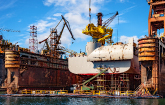NEW YORK, Sept. 17, 2024 /PRNewswire/ -- Report on how AI is driving market transformation- The global submarine market size is estimated to grow by USD 9.56 billion from 2024-2028, according to Technavio. The market is estimated to grow at a CAGR of over 5.52% during the forecast period. Fleet replacement programs is driving market growth, with a trend towards multi-mission submarines. However, limitations in submarine building capabilities poses a challenge. Key market players include Anschutz, ASC Pty Ltd., BAE Systems Plc, Fincantieri Spa, General Dynamics Corp., Hanwha Corp., Hyundai Heavy Industries Co. Ltd., Kawasaki Heavy Industries Ltd., Lockheed Martin Corp., Mazagon Dock Shipbuilders Ltd., Mitsubishi Heavy Industries Ltd., NauticExpo, Naval Group, Navantia SA, Saab AB, Submarine Manufacturing and Products Ltd., The Boeing Co., thyssenkrupp AG, Triton Submarines LLC, and United Shipbuilding Corp..
Key insights into market evolution with AI-powered analysis. Explore trends, segmentation, and growth drivers- View the snapshot of this report
Submarine Market Scope |
|
Report Coverage |
Details |
Base year |
2023 |
Historic period |
2018 - 2022 |
Forecast period |
2024-2028 |
Growth momentum & CAGR |
Accelerate at a CAGR of 5.52% |
Market growth 2024-2028 |
USD 9560.4 million |
Market structure |
Fragmented |
YoY growth 2022-2023 (%) |
5.12 |
Regional analysis |
North America, APAC, Europe, Middle East and Africa, and South America |
Performing market contribution |
APAC at 42% |
Key countries |
US, China, Russia, Japan, and South Korea |
Key companies profiled |
Anschutz, ASC Pty Ltd., BAE Systems Plc, Fincantieri Spa, General Dynamics Corp., Hanwha Corp., Hyundai Heavy Industries Co. Ltd., Kawasaki Heavy Industries Ltd., Lockheed Martin Corp., Mazagon Dock Shipbuilders Ltd., Mitsubishi Heavy Industries Ltd., NauticExpo, Naval Group, Navantia SA, Saab AB, Submarine Manufacturing and Products Ltd., The Boeing Co., thyssenkrupp AG, Triton Submarines LLC, and United Shipbuilding Corp. |
Market Driver
The submarine market is witnessing significant growth due to the development of multi-mission submarines that offer enhanced operational flexibility. For instance, the Virginia-class submarines, deployed by the US Navy, boast a flexible design for future enhancements, supporting various functions such as anti-submarine warfare, strike warfare, covert mine warfare, ISR, and naval-special warfare. These submarines feature superior imaging capabilities, advanced electronic modules for maneuvering, and a range of weapons systems, including advanced heavyweight torpedoes and Tomahawk cruise missiles. Saab Kockums' Project A26 is another example of a multi-mission submarine project, constructing two Blekinge-class submarines for the Swedish Navy. These submarines incorporate holistic quieting technology, advanced sensors, and a multi-mission portal for hosting divers and small underwater vehicles. The growing demand for multi-mission submarines, with their advanced capabilities and next-generation sonar systems, is expected to positively impact the growth of the global submarine market during the forecast period.
The submarine market is experiencing significant growth due to technological advancements in naval military and commercial segments. Nuclear Powered Submarines (NPS) and Diesel Electric Submarines (DES) continue to dominate the market, with NPS accounting for a larger share. Technological innovations in areas like nuclear energy, additive manufacturing techniques, and high-strength alloy steel are driving the defense industry's submarine capabilities. The naval military segment focuses on strengthening submarine fleets for combat, deterrent, and covert operations, while the commercial segment focus cargo transports and offshore resource exploration. Maritime disputes and geopolitical conflicts have increased the demand for submarines among seafaring nations. The defense forces are also investing in Midget submarines (SSM) for underwater detection and surveillance activities. However, the market faces challenges like layoffs due to order deliveries and missile attacks, making it crucial for naval forces to maintain strategic stabilities and naval intelligence.
Request Sample of our comprehensive report now to stay ahead in the AI-driven market evolution!
Market Challenges
- Submarines are intricate platforms for design and construction, with only a few countries possessing the capability to manufacture them independently. Emerging countries seeking to enter the submarine manufacturing industry often collaborate with developed nations for technology and design. However, these collaborations come with limitations. Developed countries are reluctant to share their best submarine technologies, instead offering second-best designs and know-how. This creates a dependence on the exporting country for technical support and services throughout the submarine's service life. Additionally, the expansion of the US submarine fleet faces challenges due to a lack of skilled workforce. It takes years to train an individual to become a skilled shipbuilder, and hiring requires significant investment. The shortage of a large, skilled workforce in a short timeframe is a significant hurdle for vendors, which will impede the growth of the global submarine market during the forecast period.
- The submarine market faces several challenges in the defense sector. Raw materials, such as high-strength alloy steel and titanium, have increasing prices, affecting the cost-effectiveness of submarine production. Defense forces worldwide are dealing with layoffs and delayed order deliveries due to budget constraints. Submarines are essential for underwater detection, surveillance activities, and reconnaissance roles, but they are also targets for missile attacks in geopolitical conflicts. Complex submarine parts, like missile fins and guidance systems, require advanced technology and materials. The use of 3D printing can help reduce costs and production time for these parts. However, the acquisition programs for ships and submarines require significant military budgets, leading to tough competition among defense contractors. Nuclear-powered submarines (SSN) and conventional submarines have different requirements - SSNs need nuclear propulsion for high speed and long voyage times, while conventional submarines rely on air and surface power. Naval intelligence and surveillance are crucial for strategic stabilities, but submarines operating in enemy territories can face risks. Deep-sea cables and groundwater bodies can also pose challenges for submarine operations near the ocean coast. Crewless submarines are a potential solution for reducing costs and risks, but they also require advanced technology and intelligence systems. The defense sector must address these challenges to maintain strategic stabilities and ensure naval dominance.
Discover how AI is revolutionizing market trends- Get your access now!
Segment Overview
This submarine market report extensively covers market segmentation by
- Type
- 1.1 SSN
- 1.2 SSBN
- 1.3 SSK
- Application
- 2.1 Military
- 2.2 Commercial
- Geography
- 3.1 North America
- 3.2 APAC
- 3.3 Europe
- 3.4 Middle East and Africa
- 3.5 South America
1.1 SSN- The submarine market is experiencing significant growth due to increasing demand for underwater exploration and defense applications. Key players include ThyssenKrupp, Rosoboronexport, and Naval Group. These companies manufacture and supply various types of submarines, such as nuclear-powered and diesel-electric, to meet diverse customer requirements. The market is driven by technological advancements, rising defense budgets, and geopolitical tensions.
Download a Sample of our comprehensive report today to discover how AI-driven innovations are reshaping competitive dynamics
Research Analysis
The submarine market is witnessing significant growth due to increasing demand from defense forces for advanced naval military segment capabilities. The key drivers for this market include the need for covert operations, surprise attacks, and deterrent capabilities. Submarines are essential for underwater detection and maritime boundary protection, making them crucial for seafaring nations involved in maritime disputes. Raw materials such as high-strength alloy steel and titanium are integral to submarine production. New submarine acquisitions continue to shape the market, with technological advancements leading to improved underwater detection systems and the integration of missile attacks. The defense sector's ongoing modernization efforts and military systems' development are also contributing to the market's growth. The ocean coast's topography and the presence of groundwater bodies play a significant role in submarine design and deployment. Maritime disputes, nuclear triad maintenance, and offshore resource exploration further fuel the demand for submarines in the defense sector. Despite the ongoing orders and deliveries, layoffs in the industry have been reported due to economic pressures and changing defense priorities. Naval forces worldwide continue to invest in submarine fleets to secure offshore territories and protect their interests.
Market Research Overview
The submarine market is a critical sector in the defense industry, driven by the demand for advanced underwater capabilities from defense forces worldwide. Raw materials such as high-strength alloy steel and titanium are essential for building submarines, including Nuclear Powered Submarines (SSN) and Diesel Electric Submarines (SS). The market is influenced by various factors such as geopolitical conflicts, military budgets, and technological advancements. Submarines play crucial roles in defense, including underwater detection, surveillance activities, reconnaissance, and covert operations. The naval military segment dominates the market, with submarines used for strategic stabilities, naval intelligence, and the nuclear triad. However, the commercial segment is growing due to the increasing demand for cargo transports and offshore resources. Technological advancements, such as 3D printing and additive manufacturing techniques, are revolutionizing the production of complex submarine parts, including missile fins and guidance systems. The defense sector is also exploring cost-effectiveness through crewless submarines and ships. Military systems are continually evolving to keep up with enemy territories and strategic stabilities. Submarines are used for missile attacks, naval intelligence, and deterrents. Naval forces rely on submarines for surprise attacks and offshore territories. The ocean coast, topography, and groundwater bodies also impact submarine capabilities. The submarine market includes various types of submarines, such as attack submarines, ballistic missile submarines, and midget submarines (SSM). Nuclear technology and nuclear propulsion are essential for powering submarines for long voyages and high speeds. Refuelings and voyage times are critical factors in the acquisition programs of submarines. The defense industry is investing heavily in strengthening submarine capabilities, including air and surface defense, and deep-sea cables.
Table of Contents:
1 Executive Summary
2 Market Landscape
3 Market Sizing
4 Historic Market Size
5 Five Forces Analysis
6 Market Segmentation
- Type
- SSN
- SSBN
- SSK
- Application
- Military
- Commercial
- Geography
- North America
- APAC
- Europe
- Middle East And Africa
- South America
7 Customer Landscape
8 Geographic Landscape
9 Drivers, Challenges, and Trends
10 Company Landscape
11 Company Analysis
12 Appendix
About Technavio
Technavio is a leading global technology research and advisory company. Their research and analysis focuses on emerging market trends and provides actionable insights to help businesses identify market opportunities and develop effective strategies to optimize their market positions.
With over 500 specialized analysts, Technavio's report library consists of more than 17,000 reports and counting, covering 800 technologies, spanning across 50 countries. Their client base consists of enterprises of all sizes, including more than 100 Fortune 500 companies. This growing client base relies on Technavio's comprehensive coverage, extensive research, and actionable market insights to identify opportunities in existing and potential markets and assess their competitive positions within changing market scenarios.
Contacts
Technavio Research
Jesse Maida
Media & Marketing Executive
US: +1 844 364 1100
UK: +44 203 893 3200
Email: [email protected]
Website: www.technavio.com/
SOURCE Technavio

WANT YOUR COMPANY'S NEWS FEATURED ON PRNEWSWIRE.COM?
Newsrooms &
Influencers
Digital Media
Outlets
Journalists
Opted In





Share this article